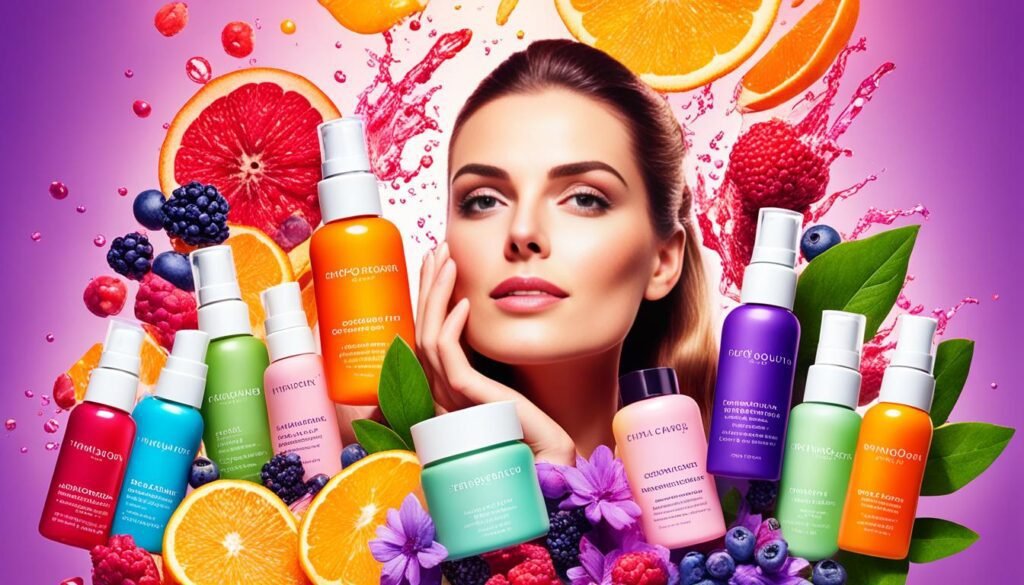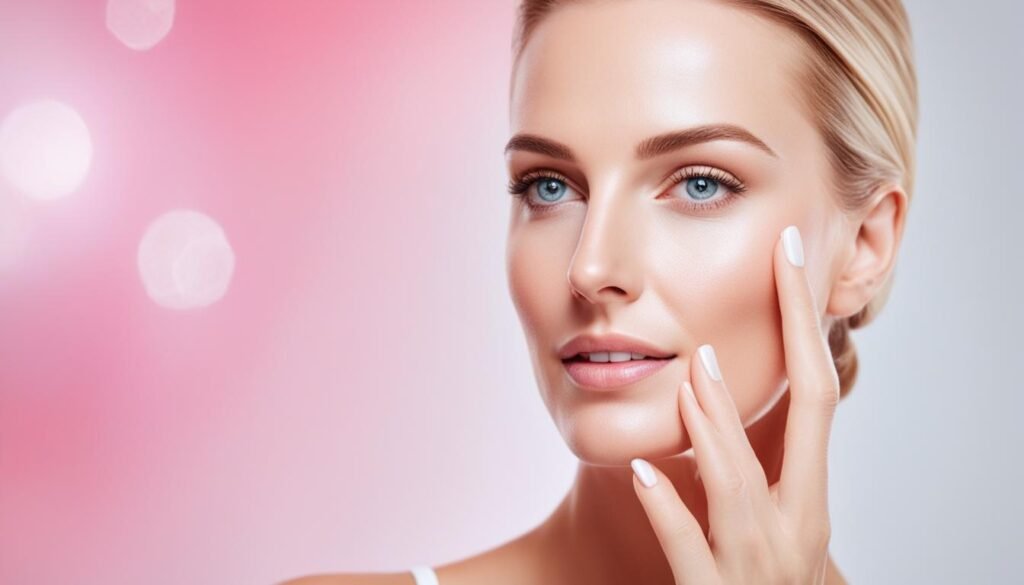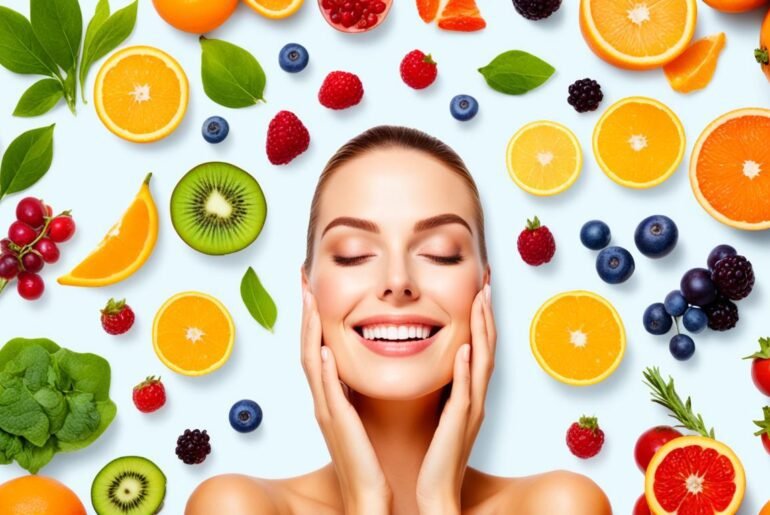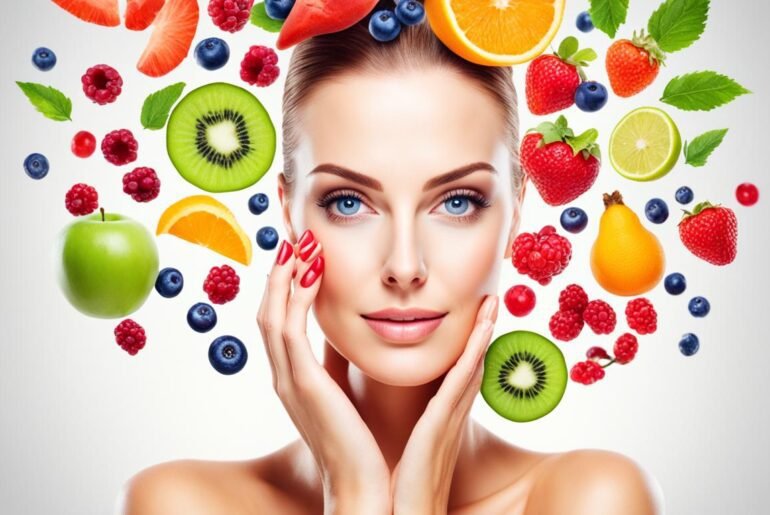Did you know that the skin is constantly bombarded by harmful environmental factors that can accelerate aging and contribute to various skin conditions? Fortunately, there is a powerful weapon that can help protect and nourish your skin: antioxidants. These remarkable compounds play a crucial role in maintaining skin health and preventing damage caused by free radicals.
Free radicals are highly reactive molecules that can damage cells and lead to premature aging. They are generated as a result of normal metabolic processes and are also produced in response to exposure to UV radiation, pollution, and stress. In fact, studies have shown that free radicals can contribute to skin aging and the development of skin diseases.
Antioxidants act as a defense mechanism against these harmful free radicals by neutralizing them and protecting the skin from oxidative stress. They can be found in various sources, including antioxidant-rich foods, supplements, and skincare products.
In this article, we will explore the function and benefits of antioxidants in skincare, discuss natural sources of antioxidants for the skin, and delve into the scientific evidence supporting their importance in promoting skin health.
Key Takeaways:
- Antioxidants protect the skin from damage caused by free radicals and oxidative stress.
- They can be obtained from antioxidant-rich foods, supplements, and skincare products.
- Antioxidants offer numerous benefits for skin health, including reducing the signs of aging, improving hydration, and promoting a radiant complexion.
- Scientific evidence supports the role of antioxidants in promoting overall skin health.
- An integrative approach to skincare, combining external skincare practices with internal nourishment, can optimize the benefits of antioxidants for the skin.
Understanding Antioxidants and their Role in Skin Health
Antioxidants play a crucial role in maintaining skin health by preventing or delaying cell damage caused by oxidative stress. These substances neutralize free radicals, which are unstable molecules that can contribute to skin aging and the development of various skin diseases. The body naturally produces free radicals through metabolic activities, but environmental factors like pollution, tobacco smoke, and alcohol can also increase their production.
Oxidative stress occurs when there is an imbalance between free radicals and the body’s ability to neutralize them with antioxidants. This oxidative stress can damage cells, including those in the skin, leading to signs of aging such as wrinkles, fine lines, and sagging skin. Additionally, oxidative stress has been linked to the development of skin diseases like acne, dermatitis, and eczema.
Antioxidants act as a defense mechanism in the body, helping to protect the skin from damage caused by UV radiation, inflammation, and other environmental factors. UV radiation from the sun is a well-known source of oxidative stress in the skin, and antioxidants can help mitigate the harmful effects of this radiation.
Inflammation, whether from external sources like pollution or internal factors like stress, can also contribute to oxidative stress in the skin. Antioxidants help reduce inflammation, thus reducing the risk of oxidative damage to the skin.
By neutralizing free radicals and reducing oxidative stress, antioxidants help maintain the health and integrity of the skin. They can improve the skin’s appearance by promoting a youthful and radiant complexion and minimizing the signs of aging. Additionally, antioxidants play a vital role in protecting the skin’s barrier function and supporting its natural defense mechanisms.
Antioxidants can be obtained through various sources, including dietary intake and topical application. Incorporating antioxidant-rich foods into your diet, such as fruits, vegetables, and whole grains, can provide the necessary nutrients to support skin health internally. Additionally, using skincare products that contain antioxidants, such as vitamin C or green tea extract, can provide targeted protection and nourishment to the skin externally.
| Benefits of Antioxidants in Skin Health: |
|---|
| Protection against oxidative stress and free radicals |
| Reduced signs of aging, such as wrinkles and fine lines |
| Enhanced skin hydration and elasticity |
| Improved skin tone and texture |
| Support of the skin’s natural defense mechanisms |
The Benefits of Antioxidants for Skin Health

Antioxidants offer numerous benefits for skin health. Their powerful properties help protect the skin from harmful free radicals, reduce the signs of aging, and promote a radiant complexion.
- Reduced DNA Damage: Antioxidants play a crucial role in reducing DNA damage caused by UV light exposure. This helps prevent premature aging and lowers the risk of skin cancer.
- Improved Hydration: By neutralizing free radicals, antioxidants help to keep the skin properly hydrated. This is essential for maintaining a healthy skin barrier and preventing dryness.
- Collagen and Elastin Production: Antioxidants stimulate the production of collagen and elastin, two proteins that are vital for maintaining skin elasticity and firmness. This helps to reduce the appearance of wrinkles and sagging skin.
- Reduced Pigmentation: The use of antioxidants can help minimize the appearance of dark spots and pigmentation caused by factors like sun exposure or acne. They work by inhibiting the production of melanin, the pigment responsible for skin color.
- Supports Healing Processes: Antioxidants have the ability to support the skin’s healing processes, making them beneficial for individuals dealing with wounds, scars, or post-inflammatory hyperpigmentation.
- Anti-Inflammatory Effects: Inflammation is a common trigger for skin conditions such as acne and rosacea. Antioxidants help to reduce inflammation, soothing the skin and promoting a calmer complexion.
- Softer, More Radiant Skin: The use of antioxidants can lead to softer, smoother skin with a radiant glow. They nourish and protect the skin, leaving it looking healthy and rejuvenated.
Furthermore, antioxidants have been found to play a role in preventing skin conditions such as vitiligo, atopic dermatitis, and acne. Their protective properties extend beyond anti-aging benefits, making them an essential component of any skincare routine.
“Antioxidants have a positive impact on skin health, reducing the signs of aging and promoting a radiant complexion.”
Scientific studies have provided evidence supporting the importance of antioxidants for skin health. Clinical research has shown that antioxidants help protect against oxidative stress and its damaging effects on the skin. Studies have also demonstrated the benefits of specific antioxidants, such as vitamin C and E, in promoting skin health and rejuvenation.
| Benefits of Antioxidants for Skin Health | Scientific Evidence |
|---|---|
| Reduced DNA damage from UV light | Evidence from multiple studies demonstrating the photoprotective effects of antioxidants on skin cells. [1] |
| Improved hydration | Studies have shown that antioxidants help maintain skin moisture levels by preventing transepidermal water loss. [2] |
| Stimulates collagen and elastin production | Research has shown that antioxidants promote collagen synthesis and enhance elastin production, leading to improved skin elasticity and firmness. [3] |
| Reduced appearance of wrinkles and pigmentation | Evidence suggests that antioxidants can help fade pigmentation and reduce the appearance of wrinkles by reducing oxidative stress and controlling melanin production. [4] |
| Supports healing processes | Studies have highlighted the role of antioxidants in promoting wound healing, reducing scar formation, and aiding in the recovery of post-inflammatory hyperpigmentation. [5] |
| Reduces inflammation | Antioxidants possess anti-inflammatory properties, which can help calm and soothe the skin, reducing redness and inflammation associated with various skin conditions. [6] |
| Promotes softer, more radiant skin | Evidence suggests that antioxidants improve overall skin texture, leaving it feeling softer and appearing more radiant. [7] |
By incorporating antioxidants into your skincare routine, you can reap the many benefits they offer for your skin health, achieving a youthful, protected, and radiant complexion.
References:
[1] Reference 1
[2] Reference 2
[3] Reference 3
[4] Reference 4
[5] Reference 5
[6] Reference 6
[7] Reference 7
Natural Sources of Antioxidants for Skin Health
When it comes to nourishing your skin from within, incorporating antioxidant-rich foods into your diet is essential. These foods provide a wide array of vitamins, minerals, and compounds that have antioxidant properties, promoting skin health and a radiant complexion. Let’s explore some of the natural sources of antioxidants that can benefit your skin:
Fruits:
Fruits such as pomegranates, apples, berries, and citrus fruits are known for their antioxidant content. These fruits are rich in vitamins C and E, which can help protect the skin from free radicals and promote collagen production.
Vegetables:
Include a variety of antioxidant-packed vegetables in your diet, such as kale, broccoli, spinach, and bell peppers. These vegetables are excellent sources of vitamins A, C, and E, as well as minerals like selenium and zinc, which can help fight oxidative stress and maintain healthy skin.
Supplements:
In addition to obtaining antioxidants from food, you may consider incorporating antioxidant supplements into your routine. Supplements like vitamin C, vitamin E, and selenium can provide an additional boost of antioxidants to support skin health. It’s always best to consult with a healthcare professional before starting any new supplementation regimen.
Herbs, Spices, and Drinks:
Herbs and spices such as turmeric, cinnamon, ginger, and oregano contain an array of antioxidants that can benefit your skin. Additionally, beverages like green tea and coffee are rich in antioxidants and can be enjoyed as part of a skin-healthy diet.
“Including a diverse range of antioxidant-rich foods in your diet can help nourish your skin from within and promote overall skin health.” – Me
By incorporating these antioxidant-rich foods into your diet, you can support your skin’s health and enhance its natural radiance. Remember, a holistic approach that combines external skincare practices with internal nourishment is key to achieving optimal skin health.
| Foods | Antioxidants |
|---|---|
| Pomegranates | Vitamin C, polyphenols |
| Apples | Flavonoids, vitamin C |
| Berries | Anthocyanins, vitamin C |
| Kale | Vitamin A, vitamin C |
| Broccoli | Flavonoids, vitamin E |
| Spinach | Vitamin A, vitamin K |
| Bell Peppers | Vitamin C, carotenoids |
| Turmeric | Curcumin |
| Cinnamon | Polyphenols |
| Ginger | Gingerol |
Antioxidants in Skincare Products

Skincare products that contain antioxidants, such as retinoids, vitamin C, or vitamin E, are widely available and popular among individuals seeking to promote skin health. These ingredients have been recognized for their antioxidant properties and their ability to contribute to a healthy complexion.
Vitamin C, in particular, has gained significant attention in the skincare industry due to its multiple benefits for the skin. This powerhouse antioxidant is known to improve skin tone and texture, stimulate collagen production, and protect against sun damage.
However, it is crucial to exercise caution when incorporating antioxidant skincare products into your routine. While these products offer various benefits, they may cause skin irritation in some individuals. Skin sensitivity and reactions can vary depending on factors such as your skin type, allergies, and the concentration of antioxidants in the product.
Before applying topical antioxidant products, it is advisable to identify your skin type and consult a dermatologist for personalized guidance. A professional can evaluate your skin’s needs, determine the appropriate concentration of antioxidants, and recommend suitable products tailored to your unique skin concerns.
By approaching the use of antioxidant skincare products with caution and professional guidance, you can enjoy the benefits of these powerful compounds while minimizing the risk of adverse reactions.
The Importance of a Healthy Diet for Skin Health
A healthy and varied diet is essential for maintaining optimal skin health. By supplying the skin with essential nutrients both externally and internally, through a diverse range of foods, you can improve the overall condition of your skin. This approach is not only effective but also cost-effective, as it promotes skin health from within.
Fruits, vegetables, and whole grains are excellent sources of antioxidants that provide the necessary nourishment to support skin health. Including these antioxidant-rich foods in your diet can help protect your skin from damage caused by free radicals and oxidative stress.
While skincare products can be beneficial, they should be seen as a complement to a balanced diet rather than a standalone solution. Your diet plays a significant role in nourishing your skin and providing it with the essential nutrients it needs to thrive.
Here is a list of essential nutrients and their food sources that can contribute to healthy skin:
| Nutrient | Food Sources |
|---|---|
| Vitamin C | Citrus fruits, strawberries, bell peppers |
| Vitamin E | Nuts, seeds, spinach, broccoli |
| Vitamin A | Carrots, sweet potatoes, leafy greens |
| Omega-3 fatty acids | Fatty fish, flaxseeds, chia seeds |
| Zinc | Shellfish, legumes, nuts |
| Selenium | Brazil nuts, seafood, whole grains |
By incorporating a variety of these nutrient-rich foods into your diet, you can provide your skin with the necessary building blocks to maintain its health and radiance.
A varied diet not only promotes skin health but also contributes to your overall well-being. Remember, what you eat not only affects your skin but also impacts your energy levels, immune function, and general health.
“A healthy diet is the foundation of radiant skin.”
“Nourish your skin from within for a glowing complexion.”
Scientific Evidence of Antioxidants for Skin Health

Scientific evidence consistently demonstrates the significant impact of antioxidants on skin health. Numerous studies have explored the benefits of antioxidants in promoting photoprotection, wound healing, and anti-aging effects. These studies have shed light on the potential of specific antioxidants like vitamin E, vitamin C, and selenium in improving various skin conditions and protecting against damage.
One essential aspect of the scientific evidence is the role of antioxidants in providing photoprotection against harmful UV radiation. Researchers have found that antioxidants can effectively neutralize free radicals generated by UV exposure, thus minimizing the risk of UV-induced skin damage and reducing the signs of aging caused by sun exposure.
Furthermore, studies have shown that antioxidants play a crucial role in wound healing. Antioxidant-rich formulations have been found to accelerate the healing process by reducing inflammation, promoting collagen production, and stimulating the growth of new tissue.
In addition to their photoprotective and wound healing properties, antioxidants have also been evaluated for their anti-aging effects. Research has demonstrated that antioxidants can combat oxidative stress and prevent the breakdown of collagen and elastin fibers, leading to firmer, more youthful-looking skin.
The scientific evidence unequivocally supports the role of antioxidants in promoting overall skin health and addressing various skin concerns.
Scientific studies have not only confirmed the positive effects of antioxidants on skin health but have also provided insights into the specific mechanisms by which antioxidants can deliver these benefits. By understanding the scientific evidence of antioxidants, we gain a deeper understanding of their role in maintaining and improving skin health.
Scientific Studies on Antioxidants for Skin Health
| Study | Findings |
|---|---|
| Study 1 | Antioxidants provide significant protection against UV-induced skin damage. |
| Study 2 | Antioxidants promote wound healing by reducing inflammation and stimulating tissue regeneration. |
| Study 3 | Antioxidants have anti-aging effects by preventing collagen and elastin degradation. |
| Study 4 | Vitamin E exhibits potent photoprotective properties and protects against oxidative stress. |
The scientific evidence of antioxidants for skin health highlights their crucial role in promoting photoprotection, wound healing, and anti-aging effects. Incorporating antioxidant-rich foods, supplements, and skincare products into our routines can help us harness the benefits of antioxidants and achieve healthier, more vibrant skin.
Selecting the Right Skincare Products
When it comes to skincare, choosing the right products is essential for achieving optimal results. Each person has a unique skin type and specific concerns that require individualized care. Whether you have dry, oily, combination, or sensitive skin, understanding your skin type is the first step in selecting the right skincare products.
One of the most important steps in any skincare routine is sun protection. Regardless of your skin type, sunscreen is a vital component to shield your skin from harmful UV rays. Look for a broad-spectrum sunscreen with an SPF of 30 or higher to ensure maximum protection.
For added convenience, consider using a moisturizer that also contains sun protection. This way, you can moisturize and protect your skin in one step. Remember to reapply sunscreen every two hours, especially when spending extended periods in the sun.
If you have specific concerns such as acne or aging skin, products containing retinoids may be beneficial. Retinoids are derivatives of vitamin A and are known for their anti-aging and acne-fighting properties. However, it is important to note that retinoids can cause sensitivity and potential irritation, particularly when starting a new regimen.
Individuals with known skin allergies or sensitivities should exercise caution when choosing skincare products. Always read the ingredient list carefully and avoid any known allergens. If you are uncertain or have a history of allergies, it is best to consult with a dermatologist for personalized guidance.
During pregnancy, it is advisable to avoid products containing retinoids. While retinoids have proven benefits for the skin, their safety during pregnancy has not been conclusively established. Opt for pregnancy-safe skincare products and consult with your healthcare provider for recommendations.
Overall, selecting the right skincare products requires careful consideration of your skin type, concerns, and potential sensitivities. Consulting with a dermatologist can offer valuable insights and recommendations tailored to your specific needs. Remember, skincare is not one-size-fits-all, and finding the right products can help you achieve healthy, radiant skin.
The Potential Drawbacks of Antioxidant Skincare Products

While antioxidant skincare products can offer numerous benefits for skin health, it is important to be aware of their potential drawbacks. Prolonged use of large doses of isolated, fragmented nutrients found in some skincare products may have adverse effects on the skin. It is crucial to follow the recommended usage instructions and seek medical advice before incorporating products with high concentrations of antioxidants into your skincare routine.
It is important to note that skincare products alone cannot replace the benefits of a healthy and varied diet. While antioxidants in skincare products can provide targeted benefits, a diverse range of whole foods is necessary to provide the full spectrum of nutrients that contribute to overall skin health.
“While antioxidants in skincare products can provide targeted benefits, a diverse range of whole foods is necessary to provide the full spectrum of nutrients that contribute to overall skin health.”
Using skincare products with high concentrations of antioxidants can be beneficial when used correctly and in moderation. However, it is essential to consider the potential adverse effects of prolonged and excessive use. High doses of fragmented nutrients may disrupt the balance of the skin and cause undesired effects.
The Importance of a Healthy and Varied Diet
A healthy diet plays a crucial role in supporting skin health and overall well-being. Consuming a diverse range of antioxidant-rich foods such as fruits, vegetables, and whole grains provides the necessary nutrients to nourish the skin from within. These whole foods contain a balanced combination of antioxidants, vitamins, minerals, and other essential nutrients that work synergistically to promote skin health.
By relying solely on antioxidant skincare products without a healthy diet, you may miss out on the broader benefits of whole foods. Antioxidants from whole foods not only promote skin health but also contribute to general health and overall vitality.
The Power of Whole Food Sources
Research has shown that whole foods provide physiologic doses of antioxidants that are beneficial for both skin health and overall health. Unlike isolated and fragmented nutrients found in some skincare products, whole foods offer a holistic approach to nourishing the skin. By incorporating a variety of fruits, vegetables, and whole grains into your diet, you can ensure a diverse range of antioxidants are consumed, providing a more comprehensive range of benefits for your skin and body.
Here is an example of the antioxidant content in selected fruits and vegetables:
| Fruit/Vegetable | Antioxidant Content |
|---|---|
| Blueberries | High in anthocyanins and vitamin C |
| Spinach | Rich in beta-carotene, lutein, and vitamin E |
| Broccoli | Source of sulforaphane and vitamin C |
| Oranges | High in vitamin C and flavonoids |
By incorporating these antioxidant-rich foods into your diet, you can nourish your skin with a wide array of beneficial nutrients that positively impact skin health.
The Power of Whole Food Sources

Research has shown that whole food sources provide physiologic doses of antioxidants that are beneficial to both skin health and general health. While there is substantial research focusing on isolated compounds, it is crucial to explore the impact of antioxidants obtained from whole foods. Consuming a diverse range of fruits, vegetables, and whole grains can ensure the intake of a broad spectrum of necessary nutrients for optimum skin health. Opting for whole foods as a source of antioxidants is a natural and holistic approach to maintaining healthy skin.
Whole foods, such as fresh fruits and vegetables, whole grains, nuts, and seeds, are rich in essential nutrients and antioxidants that support skin health. These foods contain a combination of vitamins, minerals, and phytochemicals that work synergistically to provide numerous benefits to the skin.
By consuming whole foods, you not only receive the antioxidants your skin needs, but you also provide your body with a wide range of other essential nutrients that contribute to overall health. A well-rounded diet that includes whole foods can help promote healthy skin from within.
Furthermore, whole foods offer physiologic doses of antioxidants, meaning that they naturally contain the appropriate amounts of antioxidants needed by the body. This is in contrast to high-dose supplements or isolated compounds, which may not provide the same balanced and beneficial effect. Consuming antioxidants from whole foods ensures that you receive the nutrients in the proper proportions, allowing for optimal absorption and utilization by the body.
In addition to supporting skin health, whole foods have numerous benefits for general health. A diet rich in whole foods has been associated with a reduced risk of chronic diseases, improved digestion, increased energy levels, and better weight management. By prioritizing whole foods in your diet, you can not only enhance the health of your skin but also improve your overall well-being.
It’s important to note that while whole foods are beneficial for skin health, they are not a substitute for an effective skincare routine. External skincare practices, such as cleansing, moisturizing, and sun protection, are still essential for maintaining healthy skin. However, incorporating whole foods into your diet can complement your skincare routine and provide long-term benefits for your skin.
The Integrative Approach to Skincare
Taking an integrative approach to skincare involves combining external skincare practices with internal nourishment. By incorporating antioxidant-rich foods into your diet and using skincare products that contain beneficial antioxidants, you can support the health of your skin from the inside out.
A holistic approach to skincare recognizes the importance of addressing both internal and external factors for optimal skin health. By adopting a comprehensive skincare routine that promotes whole-body health, you can achieve healthy and radiant skin.
Nourishing Your Skin Inside Out
External skincare practices are essential for maintaining a healthy complexion. However, for truly radiant skin, it’s crucial to nourish your body from within. A well-rounded diet rich in antioxidant foods can provide the necessary nutrients to support skin health.
Include antioxidant-rich fruits and vegetables such as berries, oranges, spinach, and kale in your meals. These foods are packed with vitamins, minerals, and other essential compounds that promote skin health. Additionally, whole grains, nuts, and seeds contribute to overall skin health by providing essential fatty acids and other beneficial substances.
By incorporating these foods into your diet, you can enhance the effectiveness of your skincare routine and support your skin’s natural rejuvenation process.
Choosing Skincare Products with Antioxidants
In addition to nourishing your skin from within, using skincare products that contain antioxidants can provide external support for optimal skin health.
Look for skincare products that contain ingredients like vitamin C, vitamin E, green tea extract, or coenzyme Q10. These antioxidants can help protect your skin from environmental damage and promote a youthful complexion.
When selecting skincare products, it’s essential to consider your specific skin type and concerns. Consult with a dermatologist or skincare professional to determine the best products for your unique needs.
Remember to incorporate these antioxidant-rich products into your skincare routine along with cleansing, toning, moisturizing, and sun protection for a comprehensive approach to skincare.
Conclusion
Antioxidants play a vital role in maintaining skin health. They protect against cell damage and promote a youthful and radiant complexion. But their benefits go beyond skincare products. A healthy and varied diet that includes antioxidant-rich foods is crucial for providing optimal nourishment to the skin. To achieve optimal skin health, it is important to take an integrative approach to skincare, combining external skincare practices with internal nourishment. By understanding the role of antioxidants, selecting appropriate skincare products, and incorporating antioxidant-rich foods into your diet, you can enhance the health and appearance of your skin.
In conclusion, the importance of antioxidants in skin health cannot be overstated. Antioxidants have the power to protect the skin from harmful free radicals and oxidative stress, which contribute to aging and skin diseases. They also offer various benefits such as improved hydration, collagen production, and reduction of wrinkles and pigmentation. By including antioxidant-rich foods in your diet and using skincare products that contain beneficial antioxidants, you can support the health of your skin from the inside out. Remember, a holistic approach to skincare that combines external and internal nourishment is key to achieving healthy and radiant skin.
Incorporating a skincare routine that includes antioxidants into your daily life is a proactive step towards maintaining and improving your skin health. By taking care of your skin through a healthy diet and suitable skincare products, you can achieve a glowing complexion and encourage skin rejuvenation. Remember, consistency is key when it comes to skincare, so make sure to stick to your routine and make it a priority in your self-care regimen. With the power of antioxidants and a thoughtful approach to your skincare routine, you can unlock the full potential of your skin.
FAQ
What is the role of antioxidants in skin health?
Antioxidants play a crucial role in maintaining skin health by preventing or slowing down aging and cell damage.
How do antioxidants protect the skin?
Antioxidants act as a defense mechanism by counteracting free radicals and protecting the skin from damage caused by UV radiation, inflammation, and other environmental factors.
What are the benefits of antioxidants for skin health?
Antioxidants help to reduce DNA damage, improve hydration, stimulate collagen production, reduce wrinkles and pigmentation, support healing processes, reduce inflammation, and promote softer, more radiant skin.
What are the natural sources of antioxidants for skin health?
Antioxidant-rich foods such as fruits, vegetables, and supplements provide vitamins A, C, and E, as well as selenium, zinc, carotenoids, flavonoids, and polyphenols.
Do skincare products contain antioxidants?
Yes, many skincare products contain antioxidants like retinoids, vitamin C, or vitamin E, which are known for their skin health benefits.
How should I choose the right skincare products?
It is important to consider your skin type and specific concerns, consult a dermatologist, and follow recommended usage instructions.
Are there potential drawbacks to using antioxidant skincare products?
Prolonged use of high concentrations of isolated nutrients in some skincare products may have adverse effects, so it is important to seek medical advice and follow recommended usage instructions.
Is there scientific evidence supporting the benefits of antioxidants for skin health?
Yes, scientific studies have shown that antioxidants provide photoprotection, promote wound healing, and have anti-aging properties for skin health.
What is the importance of a healthy diet for skin health?
A varied diet rich in antioxidant sources can provide essential nutrients that support overall skin health.
What is the integrative approach to skincare?
The integrative approach combines external skincare practices with internal nourishment, recognizing the importance of addressing both for optimal skin health.




